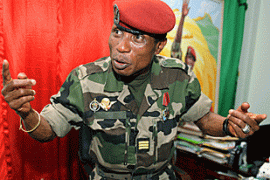UN demands trial of Guinea rulers
UN report describes killings of protesters in September as “crimes against humanity”.

Camara is currently recovering at a hospital in Morocco, after being shot in the head by an aide on December 3.
‘Systematic’ killings
The military government has denied responsibility for the massacre, saying it was the actions of a small number of rogue military personnel.
But the UN commission said the killings and rape were “systematic” and “organised” and it called on the International Criminal Court to impose sanctions against the “main perpetrators”.
| IN DEPTH |
|
|
 Background: Tensions in Guinea Background: Tensions in Guinea Camara: A man of the people? Camara: A man of the people? |
The commission said at least 109 girls and women were subjected to “rapes and other sexual violence, including sexual mutilations and sexual slavery”, with hundreds more subjected to torture and abuse during the crackdown.
The inquiry, which is based on nearly 700 interviews of witnesses in and around Conakry, corroborates reports from rights groups and witnesses that more than 150 people were killed or went missing at the rally.
The military government, which seized power in a coup following the death of the president last December, has insisted that only 57 people were killed and released their bodies shortly after the incident.
It said that the majority of them had been killed in a stampede inside the stadium in Conakry where the demonstration was being held.
But last week, the New York-based Human Rights Watch organisation accused the Guinean army of attempting to cover-up the killings.
The organisation said that an investigation into the massacre found “strong evidence … that the military engaged in a systematic effort to hide the evidence of their crimes and misrepresent the number killed”.
Among the evidence were witness accounts of the removal of bodies from city morgues and a military camp for burial elsewhere, in some cases in mass graves, Human Rights Watch said.
